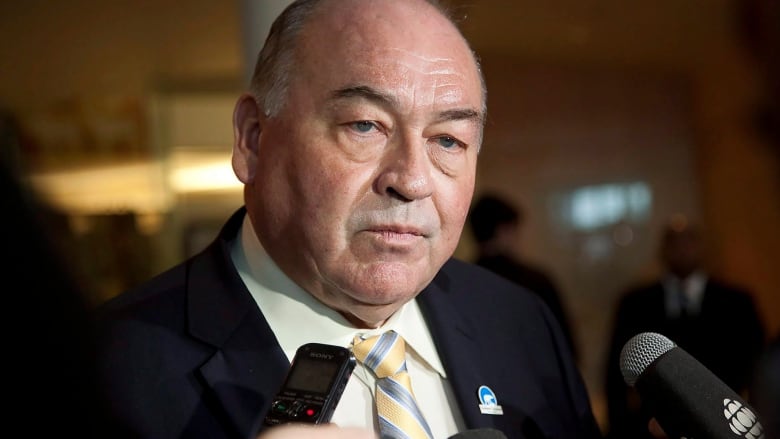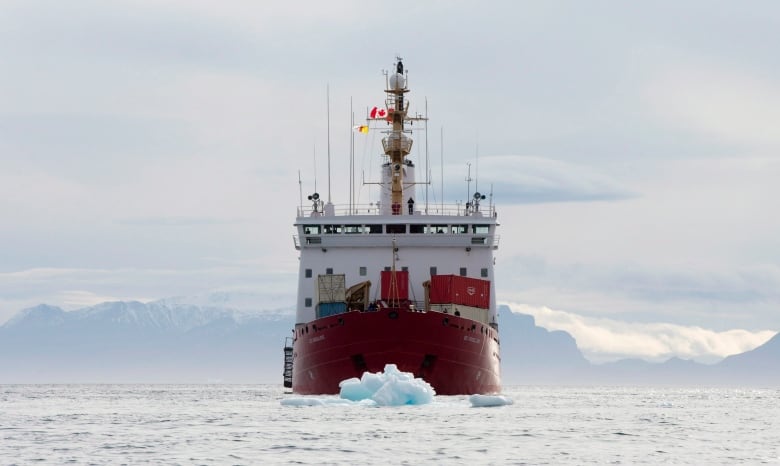N.W.T. premier will push Ottawa for greater military presence, more icebreakers in the North
Bob McLeod’s vision for the future includes a 5,000-person military base in Inuvik, N.W.T.
Laurie Sarkadi · CBC News · Posted: May 01, 2019
N.W.T. Premier Bob McLeod says his vision for the North includes a stronger military presence, and more investment in transportation infrastructure. (Bill Braden/Canadian Press)
N.W.T. Premier Bob McLeod is laying out a vision for the North's future that includes an increased military presence and major development of Arctic waters for transportation.
"We need to position Canada's North as a central international transport hub for the future of the Arctic and we see significant more infrastructure investment required," McLeod said in a recent interview with CBC Politics in Ottawa.
McLeod said he'll be presenting this and other ideas to the federal government in Ottawa within the next month.
The premier wants Canada to triple its icebreaker fleet within five years and triple its deepwater port capacity within 10 years.
"I think that you see other Arctic countries becoming significant players in the Arctic and we need to be sure that Canada and the North is ready for when that happens," McLeod said.
The Coast Guard icebreaker Des Groseilliers sails in the water of the Arctic Archipelago. N.W.T. Premier Bob McLeod wants the federal government to build more icebreakers to serve the North. (Adrian Wyld/The Canadian Press)
Both China and Russia have shown growing interest in the Arctic. The Barents Observer of Norway reported in February that Russia plans to use supersonic jet fighters to make regular patrols of the North Pole, something Russia hasn't done since the Cold War.
McLeod said Inuvik, located 100 kilometres from the Beaufort Sea, should play a key security role.
"We'd like to see a full military base, preferably in Inuvik, of about 5,000 permanent personnel," he said.
While the federal government announced last fall that Yellowknife will be home to a new Arctic Region Coast Guard base, McLeod said there should be a base in the Beaufort Sea.
Officials from all three northern territories are meeting in Yellowknife on Wednesday. The Arctic Security Working Group will discuss safety, security and defence issues, along with the commander of the Canadian Forces' Joint Task Force North.
It's unknown whether McLeod's vision of a more militarized North will be part of the federal government's much-anticipated Arctic Policy Framework, which may be released as early as June.
The new Arctic policy initiative was announced in December 2016 to replace the 2009 Northern Strategy and the 2010 Statement on Canada's Arctic Foreign Policy under Stephen Harper's Conservative government.
The current federal government recently added foreign affairs and national security, as well as reconciliation, to the list of themes the new policy will address.
"We've been working with the government of Canada on a 10-year vision and plan for Arctic Canada and I've been going to a lot of Arctic conferences and realizing that Canada is falling way far behind the other Arctic countries," McLeod said.
"So we're coming up with a plan where the Arctic will become a critical international arena of economics, science and infrastructure and environment strategy."
Icebreaker U
In order to increase understanding of the Arctic, McLeod envisions a Canada-wide civil service rotation program in which senior bureaucrats from the South spend time living in the North. He'd also like to see a federal department of Arctic affairs and a northern immigration program.
"We think that we need more immigration and the fact is we don't have enough people up here. We're also looking at having a permanent offshore Arctic university school on one of the existing icebreakers," he said.
McLeod said he takes climate change and Arctic ecology "very, very seriously." His vision for the N.W.T., however, remains steeped in fostering transportation corridors and pipelines to accommodate the oil and gas industry.
McLeod says innovation is needed to find alternate energy sources for 20 diesel-dependent communities beyond solar and wind, given that neither of those can supply continuous, year-round power to communities.
McLeod has been premier of the N.W.T. since 2011. He is the MLA for the riding of Yellowknife South. The next territorial election is Oct. 1.


